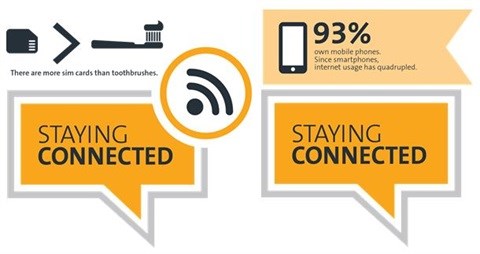The mass market is now staying connected and this is becoming more and more prevalent, this market owns more sim cards than toothbrushes and 93% own mobile phones. Since the inception of smartphones internet usage has quadrupled.
According to Internet World Stats, South Africa had 2.4 million internet users in 2000 and this has increased to 24.9 million in 2014, the internet penetration of the entire population is 51.5 %. Internet usage in South Africa accounts for 8.4 % of the total internet usage on the African continent.
The mass market usually first experience the internet through social media, and the savvy marketer will use social media channels to reach this market online. Ads24's mass market titles, Daily Sun; Son; Ilanga and their digital properties have a national reach of 7.3 million people, which is comparable to the entire population of Hong Kong. The readers of these titles spend R32bn each month.
Professor John Simpson from the Unilever UCT Institute, referring to the Landscape 2015 study, says that a trend that will have a great bearing on South Africa going forward is, "The rapid increase in use of social media. There's a view that poor people don't have access to the internet or social media for that matter. In fact, nearly a quarter of Survivors (people who live in households of less than R6,000 per month income) own smartphones and this is growing rapidly. Retailers tell us that smart phones now outsell other phones.
"Word-of-mouth is also very strong in this market and, like social media, it can make or break marketers. We see a natural trend into the use of social media for this group of consumers. The media landscape is changing, there is an increase in social media and its growing quicker than people think."
Consumers are seeking credibility from brands, Ask Afrika's TGI Township research reveals that word-of-mouth garners the greatest trust, South Africans are taking word-of-mouth online and are champions of mobile internet and social networking, providing a platform of greater social cohesion.
An article by Daniel Schmidt, Understanding the South African mobile consumer, published on The MediaOnline in December states, "In this constantly connected world, South Africa, with 53 million inhabitants, is swiftly growing up on the digital front. A recent survey by ourmobileplanet.com found that 29 million South Africans use a mobile phone, 20.5 million a smartphone. It's relatively easy to get a smartphone contract in South Africa and this has been good for our nation's internet penetration. The study found that of the country's mobile users, 57% hardly ever use a desktop computer, reinforcing the perspective that mobile is the key to South Africa's rapidly evolving digital scene.
"Smartphone penetration in South Africa is at a healthy 40%, putting it above Brazil, Russia, India and Turkey. This means that advertisers have had to change the way they target South African consumers. The web users that do operate multiple devices are usually the ones with slightly more buying power, but behavioural shifts have seen consumers switching between devices while in the purchasing cycle. This behaviour is consistent within the South African market - and more smartphones translates into more confident mobile consumers. This can be seen in the data: people are using their phones to make transactions on sites that they trust and mobile conversions are up."
The UCT Unilever report, Connecting to Survivors, states that Survivors have been on the wrong side of the digital divide, but this is changing rapidly, the report says that the digital revolution will be mobilised. The cost of data and devices is dropping. The South African National Taxi Association is rolling out free Wi-fi in taxi ranks and in taxis. Wi-fi will also become available in MyCiti buses. Twenty-three percent of Survivors have smartphones, compared to 70% of LSM 8-10s, but demand and access is growing. The research shows that there is also a movement from online social engagement to productive usage, with the youth market using the internet to search for jobs.
Mobile consumers of the Daily Sun have been experiencing a vastly improved product since December 2014 when the newspaper title launched its first app, and adapted its website so that the new responsive design is accessible on any type of handset with access to the internet.
Many people are now reading news online and Google clearly sees the value in newspapers and will spend $163m to set up the Digital News Initiative, a partnership with eight leading European publishers including The Financial Times, The Guardian, Germany's Die Zeit and Spain's El Pais. In a blog post, Google says the fund will be used for product development, training and research and stimulating innovation in digital journalism. Google staff will work directly with newsrooms, set up training partnerships with journalism organisations and give grants to academic institutions.




































